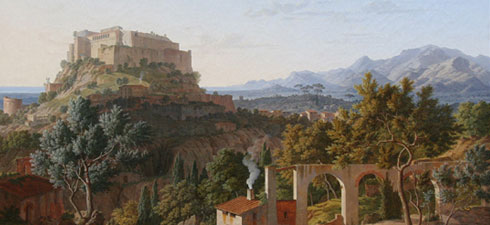One of our family stories that has always fascinated me concerns a regiment of Italian soldiers (part of the German eastern offensive) who arrived in my home town of Floresti in the summer of 1942. It was a tale that had little to do with the classic war stories of the Soviet films of my childhood. What we heard of the Italians was always marked by a detached philosophical tone. As children, in a remote part of the world, this account of the forces of history on our doorstep inspired a fear of the unknown, but also a sense of curiosity.
It was a curiosity that always led to embarrassed words between my grandparents. There was a tension there that I did not understand, the source of which was only revealed many years later. The billeting of the Italians in Floresti did not achieve the epic dimensions of Captain Corelli — a film shot in 2001, based on the novel by Louis de Bernières. But my grandparents' village did have something of the austerity of the Ionian island of Cephalonia occupied by the Italian troops in the film. Then there was the romance of my grandmother, Ioana, the village school teacher, with a young lieutenant Vincenzo, from Massa-Carrare — the famous marble carvers' region of Tuscany.
Their dalliance has left a number of traces: there were seven letters sent after the regiments' departure, and my Grandmother's lifelong nickname of "the Italian." Vincenzo had acquired a few words of Romanian, which he used to construct these missives, and reading them years later, I was inspired to write a novel. I set about the task of collecting more information. My cousins in Italy, who have settled there with their wives and children, proved to be a valuable source of assistance. It was with their help that I finally succeeded in unravelling the story that led to Vincenzo's home town.
In recent years, much has changed in Moldavia. The bandstand where we used to dance on Sundays has now become a distribution platform for parcels and money orders in euros, sent by family members that have left to work abroad. Watching the arrival of the jammed minibus, you can see that the excitement is not solely generated by the prospect of much-needed money, but the sense of a connection with the pulse of the world, with a Europe that counts for something. It is also an opportunity to build bridges for the future, because those who receive are also eager to send letters and parcels of cheeses and homemade jam.
The Moldavian migration to the West is not just the tragic tale of a people whose poverty has forced them to leave home, it is a way of reaching out to history; to the history that our grandparents encountered 65 years ago, in the form of contingents of troops who spoke a strangely musical tongue. It is a bridge across the ages, magically drawn from the army-issue ink pot used by Vincenzo. Could Europe have grown from an inkwell? I wonder if somewhere in Italy, someone has an emotional map with a flag for Floreşti, like the one that has marked Massa-Carrare in my family's affectional topography? I dream of travelling to the marble carvers' town to visit the castle on the hill. Hopefully, it will be majestic, and bathed in light, just as I have imagined it in so many summer afternoon daydreams.
Was this article useful? If so we are delighted!
It is freely available because we believe that the right to free and independent information is essential for democracy. But this right is not guaranteed forever, and independence comes at a cost. We need your support in order to continue publishing independent, multilingual news for all Europeans.
Discover our subscription offers and their exclusive benefits and become a member of our community now!












